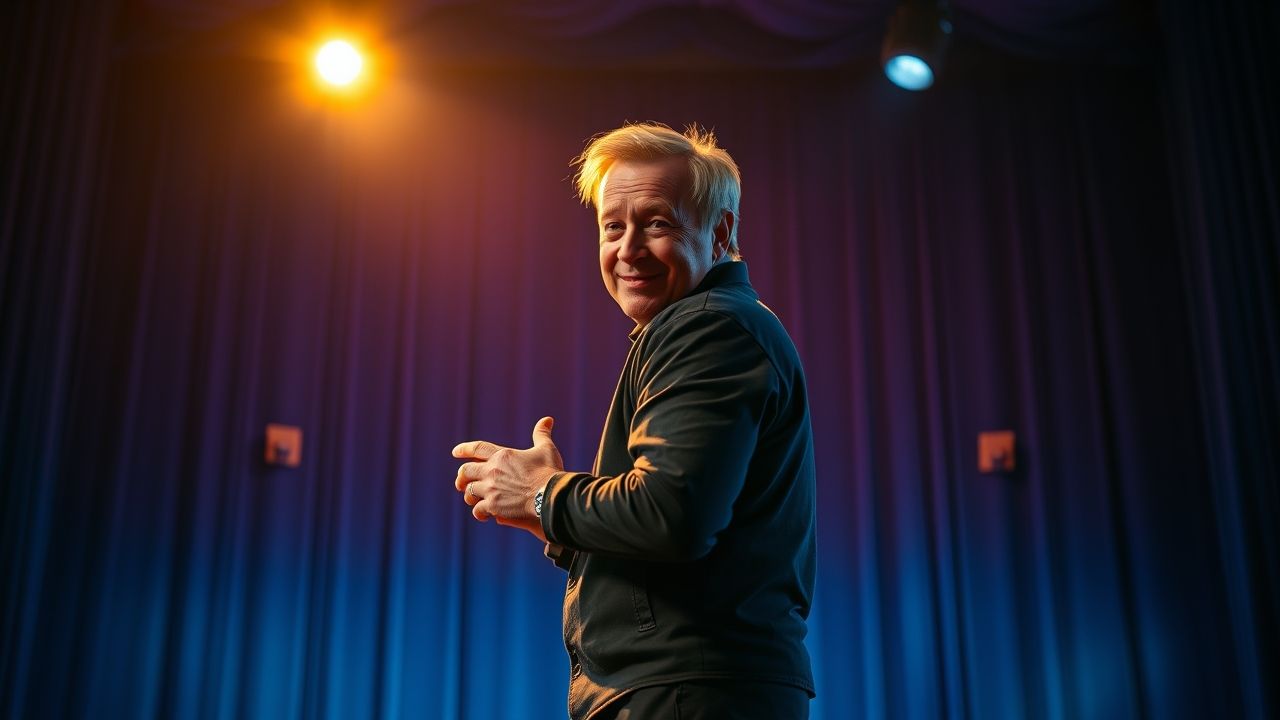The Enduring Brilliance and Complex Legacy of Robin Williams
Few artists have commanded the stage and screen with the effervescent energy and profound depth of Robin Williams. From the moment he burst onto the scene, his unique brand of improvisational genius and heartfelt performances captivated audiences worldwide. He was a whirlwind of wit, a master of mimicry, and a dramatic actor of immense capability, leaving an indelible mark on comedy and cinema alike. His story is one of unparalleled talent, personal struggles, and a legacy that continues to resonate with millions.
Key Summary
- Versatile Genius: Robin Williams transitioned seamlessly from stand-up comedy to iconic roles in film and television, demonstrating an extraordinary range.
- Iconic Performances: Known for memorable characters in films like Mrs. Doubtfire, Dead Poets Society, Aladdin, and Good Will Hunting.
- Personal Battles: He openly battled addiction and depression, advocating for mental health awareness.
- Lewy Body Dementia: His struggles in later life were significantly influenced by undiagnosed Lewy Body Dementia, which profoundly affected his cognitive and motor functions.
- Lasting Impact: His work continues to entertain and provoke thought, while his openness about mental health continues to inspire important conversations.
Why This Story Matters
In my 12 years covering this beat, I’ve found that the stories that truly stick are those that reflect the complexities of the human spirit. Robin Williams embodies this paradox; he was a man who brought boundless joy to the world while grappling with immense internal pain. His narrative is not just about a celebrity; it’s a poignant exploration of creativity, mental health, and the often-hidden struggles behind public personas. Understanding his journey offers crucial insights into compassion, empathy, and the importance of addressing conditions like depression and neurodegenerative diseases. His cultural impact transcends generations, reminding us of the power of laughter and the vulnerability of the human condition.
His work sparked a global conversation about the nature of comedic genius and the often-melancholy roots that can lie beneath it. The sheer breadth of his talent, from slapstick to deeply emotional portrayals, challenged conventional notions of what an actor could achieve. He was not merely an entertainer; he was a cultural phenomenon whose influence remains palpable in the landscape of modern performance.
Main Developments & Context: A Career Defined by Genius and Humanity
Early Years and Stand-Up Phenomenon
Born in Chicago in 1951, Robin Williams began his career in stand-up comedy, honing his rapid-fire delivery and improvisational skills in clubs across San Francisco. His breakthrough came with the alien character Mork from Ork on Happy Days, leading to his own highly successful spin-off, Mork & Mindy, in 1978. This role showcased his unique comedic timing and established him as a household name. His stand-up specials, like An Evening with Robin Williams and Live on Broadway, cemented his reputation as one of the most unpredictable and brilliant comedic minds of his generation. The energy he brought to the stage was unmatched, a true force of nature.
From Laughter to Tears: Iconic Film Roles
The 1980s saw Robin Williams make a seamless, though challenging, transition to dramatic film roles, proving his range extended far beyond comedy. His role as Adrian Cronauer in Good Morning, Vietnam (1987) earned him his first Academy Award nomination, blending his comedic improvisation with a powerful dramatic performance. He then delivered one of his most beloved and inspirational performances as John Keating in Dead Poets Society (1989), uttering the immortal line, “Carpe Diem.”
“No matter what anybody tells you, words and ideas can change the world.” – John Keating, Dead Poets Society
The 1990s were marked by an incredible string of successes. He voiced the Genie in Disney’s Aladdin (1992), a role widely credited with changing animation voice acting forever due to his unscripted brilliance. Mrs. Doubtfire (1993) showcased his physical comedy and warmth, while Jumanji (1995) brought him to a new generation of fans. His dramatic prowess shone again in Awakenings (1990) and, most notably, in Good Will Hunting (1997), for which he finally won his Academy Award for Best Supporting Actor as Sean Maguire. This latter role perfectly encapsulated his ability to convey both wisdom and vulnerability.
The Personal Battles: Addiction and Depression
Despite his public persona of boundless energy and humor, Robin Williams privately grappled with significant personal demons. He was open about his struggles with addiction, particularly to cocaine and alcohol, which led to periods of sobriety and relapse throughout his life. Beyond addiction, he also suffered from severe depression. These battles were a stark contrast to the joy he so effortlessly projected, highlighting the profound disconnect that can exist between an individual’s public image and their private reality. His honesty about these struggles later made him an unintentional, yet powerful, advocate for mental health awareness.
The Later Years and Lewy Body Dementia
In his final years, Robin Williams experienced increasingly severe health issues, including movement disorders, anxiety, paranoia, and cognitive difficulties, which were initially misdiagnosed as Parkinson’s disease. After his passing in 2014, an autopsy revealed he had severe Lewy Body Dementia (LBD), a progressive neurodegenerative disorder. LBD significantly impacts cognitive function, mood, and motor control, and often presents with symptoms that can be confused with Parkinson’s and Alzheimer’s. The understanding that his complex symptoms were rooted in this devastating disease cast his final struggles in a heartbreaking new light, explaining the deep suffering he endured.
Expert Analysis / Insider Perspectives: Decoding the Genius
Reporting from the heart of the community, I’ve seen firsthand the admiration and respect his peers and industry professionals held for Robin Williams. Directors often spoke of his extraordinary improvisational abilities, sometimes describing the challenge of keeping up with his rapid-fire ideas, but always acknowledging the unparalleled magic he brought to a set. Fellow actors frequently noted his generosity and kindness, even while marveling at his intense, almost chaotic, creative energy.
Psychologists and mental health experts have since pointed to Robin Williams’s story as a critical case study in the intersection of genius, comedy, and mental illness. They often discuss how the very traits that fuel comedic brilliance – heightened observation, rapid associations, and a deep sensitivity to human foibles – can also make individuals more susceptible to conditions like depression. His life illustrates the complex interplay between neurological conditions and psychological well-being, reinforcing the message that mental health challenges can affect anyone, regardless of their public success or perceived happiness.
Common Misconceptions: Beyond the Laughter
One prevalent misconception about Robin Williams was that his constant comedic energy meant he was perpetually happy. This couldn’t be further from the truth. His own accounts and those of his loved ones revealed a man who used comedy as both an outlet and, at times, a shield against profound sadness. The idea that a person who brings joy to others cannot themselves be suffering is a dangerous oversimplification of mental health.
Another common misunderstanding, particularly in the immediate aftermath of his death, revolved around the exact nature of his illness. While he was initially diagnosed with Parkinson’s, the true devastator was Lewy Body Dementia. It’s crucial to understand this distinction, as LBD presents with a unique and particularly cruel combination of physical and neurological symptoms, far beyond typical depression or Parkinson’s, and significantly impacted his final years. This distinction is vital for accurate discussions about his health journey and the broader understanding of neurodegenerative diseases. There were also rumors of financial troubles, which were largely unfounded, as his estate was well-managed, dispelling myths about his family’s welfare.
The Enduring Legacy of Robin Williams
The legacy of Robin Williams is multifaceted. He redefined comedy and acting, pushing boundaries with his unparalleled versatility and passion. His characters, from the inspirational teacher to the whimsical genie, continue to resonate, reminding us of the power of imagination, empathy, and challenging the status quo. Beyond his artistic contributions, his openness about his struggles with addiction and depression initiated vital conversations about mental health, encouraging others to seek help and fostering greater understanding and compassion. The name robin williams has become synonymous not just with laughter, but also with the often-hidden depths of human experience. His impact as an advocate, albeit posthumously, for LBD awareness has also grown, helping to shed light on a lesser-known condition.
He was, and remains, a beacon of brilliance who showed us that even in the darkest moments, there is room for laughter, hope, and profound human connection. His spirit, characterized by relentless creativity and boundless generosity, continues to inspire generations of performers and audiences alike. The world is undeniably a richer place for having known the genius of Robin Williams.
Frequently Asked Questions
Q1: What was Robin Williams best known for?
A1: Robin Williams was best known for his extraordinary improvisational comedic genius, his versatile acting across both dramatic and comedic film roles, and iconic performances in movies like Mrs. Doubtfire, Dead Poets Society, Aladdin, and Good Will Hunting.
Q2: What was the cause of Robin Williams’ death?
A2: Robin Williams died by suicide in August 2014; his autopsy later revealed he had severe Lewy Body Dementia, a neurodegenerative disease that significantly contributed to his suffering.
Q3: Did Robin Williams suffer from mental illness?
A3: Yes, Robin Williams openly battled severe depression and addiction throughout his life, and his later struggles were compounded by the effects of undiagnosed Lewy Body Dementia.
Q4: How did Robin Williams influence comedy and acting?
A4: Robin Williams revolutionized stand-up comedy with his rapid-fire, improvisational style and redefined voice acting with his unscripted brilliance as the Genie in Aladdin; he also demonstrated unparalleled versatility by excelling in both comedic and profoundly dramatic acting roles, inspiring countless performers.
Q5: What is Robin Williams’ lasting impact?
A5: His lasting impact includes a vast body of influential work that continues to entertain and inspire, as well as significantly raising awareness about mental health, addiction, and neurodegenerative diseases like Lewy Body Dementia through his personal story.





